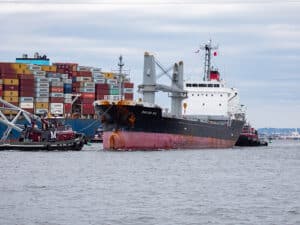
OSG sees liquefied CO2 carriers in its future
Written by Nick Blenkey
OSG president and CEO Sam Norton: “Transporting liquified CO2 is a natural next step into an exciting emerging market, consistent with OSG’s expertise with liquid cargoes.“
Tampa, Fla., headquartered Overseas Shipholding Group Inc. (NYSE:OSG) is looking to get into the growing carbon storage and transport business, including operating liquefied CO2 carriers, and it’s taking its first steps right outside its own front door with plans for a project in Port Tampa Bay.
The company has been awarded a $400,000 U.S. Department of Energy grant to study the development of its proposed Tampa Regional Intermodal Carbon Hub (T-RICH). The study is intended to evaluate the commercial feasibility of developing an intermediate storage hub at Port Tampa Bay for CO2 captured from industrial emitters across Florida. T-RICH would receive, store, and process two million metric tons of CO2 per year, which would be transported by OSG LCO2 carrier vessels across the Gulf of Mexico for permanent underground storage. The storage and transport hub will be the first of its kind in the U.S. and could be scaled to meet expanded volumes of captured CO2.
“Overseas Shipholding Group has an extensive track record of adopting industry leading new technologies and developing innovative solutions in energy transportation,” said OSG president and CEO Sam Norton. “Transporting liquified CO2 is a natural next step in an exciting emerging market, consistent with OSG’s expertise with liquid cargoes.”
“The development of a hub storage terminal at Port Tampa Bay will provide a comprehensive solution to allow Florida’s industrial facilities to be part of the nation’s response to the impacts of climate change and to which Florida is vulnerable,” he added.
“OSG is a longtime strategic partner and provider of maritime transportation services at Port Tampa Bay,” said Port Tampa Bay president and CEO Paul Anderson. “This grant will make an important contribution as we work with OSG in exploring the development of a carbon distribution hub.”
“Florida’s total CO2 emissions from power generation and industrial facilities is among the largest in all states in the country. But Florida has no pipeline system capable of transporting captured CO2,” said Norton. “OSG’s proposed hub site at Port Tampa Bay would aggregate and store CO2 captured from emitters for loading onto specialized liquified CO2 vessels to be operated by the company. These vessels would then deliver their cargoes to the northern Gulf of Mexico, which has the largest confirmed capacity for safe, deep, permanent underground sequestration of captured CO2. “
OSG notes that the DOE is encouraging the development of carbon capture and storage systems as part of the United States’ goal to reduce CO2 emissions to achieve net zero carbon by 2050. Carbon capture and storage systems are expected to provide up to 30% of that total carbon emission reduction. Creating this supply chain will connect Florida to the fast-maturing CO2 industry, will help improve air quality for all Florida residents, and would provide hundreds of new jobs involving innovative technology and infrastructure in Florida to support carbon capture, storage, and transport systems that OSG is promoting.




